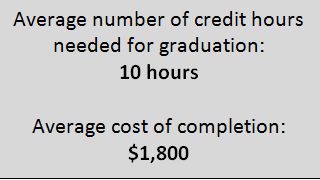Attracting Returning Adults: The Right Messaging Helps You Do the Right Thing
Published by: WCET | 3/22/2016
Tags: Completion, Marketing, Prior Learning Assessment, Retention, Student Success
Published by: WCET | 3/22/2016
Tags: Completion, Marketing, Prior Learning Assessment, Retention, Student Success
If you talk to an academic advisor about degree completion for any period of time, you will hear heartbreaking stories of the students who “got away” (students who got close to the goal of graduation but had to stop for a variety of reasons). More than likely, the advisor has reached out to these near completers on numerous occasions to try to assist them in returning to finish their degree requirements, but life continues to get in the way.
Perhaps it is the rising cost of attendance that prevents the return or perhaps the student has relocated to another state making in-class attendance impossible. In some cases, the students eventually return to finish. However, the true heartbreak is that many students don’t return and give up on the dream of becoming a college graduate.
We Learned from Failed Initiatives
In 2011, the University of Memphis launched a recruitment campaign called Back on Track which targeted this population of near completers. While we experienced moderate success at getting students interested in returning to the institution, there were not significant jumps in enrollment or graduation in the following semesters. In the spring of 2013, another campaign called Experience Counts highlighting our Prior Learning Assessment (PLA) opportunities again garnered interest but failed to result in a substantial rise in enrollment numbers.
Obviously, we needed to re-calibrate and ultimately discovered that our main flaw was bringing the students back to tell them the same message that they already knew. They knew what they needed to complete and all of the challenges associated with that completion; that’s likely why they left or have stayed away. It also began to weigh on us that, as an institution, we were co-conspirators in the fact that a student almost gets to graduate but then stops, often times saddled with debt without a credential to show for it. We resolved to change the message and design a program that would allow students to explore how their completion could be achieved differently.
A New Approach: The Finish Line Program
In the fall of 2013, we piloted a degree completion initiative with one advisor in one department that flipped the “come back” message to students which would explore ALL possible degree completion pathways, evaluate all PLA strategies, and determine eligibility for a one time scholarship. It was ultimately an opportunity for the student to re-imagine what degree completion could be without all of the previously experienced challenges.
Within a few months, 50 students had re-enrolled and 17 students had graduated. Administrators were pleased with the early results of the pilot, and the Finish Line Program was launched at the institution level with a staff of two full time academic advisors and a program director.
Thus far, almost 500 students have been re-recruited back to the institution generating over 2,000 credit hours for the institution. More importantly, 172 students have graduated and fulfilled their goal of earning a bachelor’s degree.
Lessons Learned
First and foremost, we have learned to be ready for almost anything. It’s been surprising to discover students who just aren’t “interested” in completing their degree even when there are flexible, low-cost, efficient completion plans available. In some cases, students are embarrassed to admit that they have not finished their degree, particularly if family and friends thought otherwise. Other students thought their departure would remain “anonymous” especially in an institution of our size with over 20,000 students.
Regardless of the situation or perceived situation from the student’s perspective, it is important to try to understand where they are before you try to sell them on the message that they should return. The comfort of not having to face the challenges again can discolor even the best of news from the best of sources.
 Some other lessons that we have learned:
Some other lessons that we have learned:
Perhaps the most important lesson is to not give up on these students or your efforts to re-engage them in the important work of completing their degree. If we had dismissed our efforts in those early campaigns, we would never have discovered the importance of changing our re-recruitment messaging. Also, we would have lost the opportunity to change the lives of our 172 graduates and their families, as well as the community, state, nation and world in which they live.
Tracy P. Robinson
Director, Innovative Academic Initiatives
University of Memphis
tprobnsn@memphis.edu